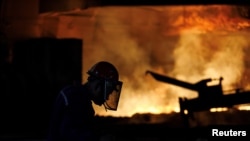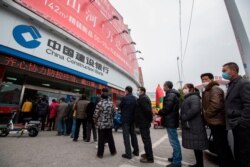The coronavirus outbreak will likely take a bigger-than-expected toll on China’s economy this quarter as the latest business conditions index, compiled by the Cheung Kong Graduate School of Business (CKGSB) since 2012, dropped to a historic low in February.
Analysts say, amid a slowing economy, China is already trapped in a corporate debt default crisis, which further threatens the survival of local businesses especially small- and medium-sized enterprises (SMEs) being badly hit by the epidemic.
The monthly index, which measures the business sentiment of private SMEs in China, dropped from January’s 56.2 to an all-time low of 37.3 in February — far below the threshold of 50 that suggests the variable will keep falling.
Confidence crash
The sharp fall reflects “the extreme pressure faced by Chinese companies” or “a confidence crash,” said Li Wei, finance professor at the CKGSB and head researcher of the index, in a commentary.
Two of the indicator’s four sub-indices — sales and profits — fell sharply to 32.8 and 24.3 this month respectively from last month’s 72.1 and 60, which suggests companies surveyed are in a revenue crisis.
The financing sub-index slightly dropped since the companies’ financing needs are put on hold if they can’t operate while their inventory forecasts edged up — an improvement that Li said is hardly a good thing now.
The survey also looks into prospects for costs, prices, investments and recruitments in the next six months.
It showed that forecasts of labor and overall costs as well as consumer prices went south this month. Among them, if the sub-index of consumer prices forecasts, which already dipped to 37.6 from 53.6 in a month, keeps plummeting dramatically, “we can expect deflation,” according to Li.
Another cause for concern, Li added, is this month’s massive drops in investment and recruitment prospects from 60s to 40s, which suggest companies are expecting contraction.
Contraction in sight?
"If this goes on, economic downturn is a natural conclusion,” Li said.
The survey also found that 45 percent of respondent companies said they have not been able to resume operation as a result of strict quarantine measures while another 49 percent said they have just restarted work.
And 61 percent of surveyed companies have no faith that their production capacity will recover more than 60 percent by the months’ end.
Based on such a grim prospect toward the disease’s impact on businesses, Li projected that China’s economic output value may shed by half in the first quarter. That means that China has little chance meeting its 6 percent growth rate target this year.
The full-year economy, instead, will likely contract by 3.2 percent or worse by 6.7 percent even if growth in the next three quarters remains unaffected by the outbreak at 6 percent — according to two of Li’s most optimistic assumptions, based on the Chinese government’s favorable outlooks.
Li’s forecasts are a sharp contrast to those by major global economic institutes including IHS Markit, the International Monetary Fund or the Economic Intelligence Unit, which took reference from the 2003 SARS impact pattern and revised downward China’s GDP target by 0.4 to 0.5 percentage points. “
If the outbreak can be contained this quarter, then this full-year growth will be at around 5.5 percent [from China’s 6 percent target]. However, shall the outbreak’s impact extend to another quarter, China may have a hard time keeping a 5 percent economic growth this year,” said Darson Chiu, a research fellow at the Taiwan Institute of Economic Research in Taipei.
On Saturday, China's former central banker David Li, director of Tsinghua University’s center for China in the world economy, forecast that the coronavirus outbreak will drop China’s economic growth by 0.17 to 0.77 percentage points this year.
That means the Chinese economy will grow 5.23 percent this year even if the outbreak ravages till the year’s end, according to Li’s estimates.
To boost the Chinese economy, it is important that companies soon resume their production, which he said works better than any fiscal or monetary stimulus.
Liquidity crunch
Chiu, however, warned that China’s debt default rate has been on the rise during the U.S.-China trade war, which may further push outbreak-hit businesses into a liquidity crisis.
Shall that worsen, massive business closures and labor layoffs may follow, he said.
Statistics showed that China ended 2019 with record corporate bond defaults, amid the slowest growth in almost three decades. More than 150 onshore companies reneged on debt payments totaling about US $19 billion. That was up from 120 companies and US $17.6 billion in 2018.
CKGSB’s Li urged the Chinese government to optimize quarantine measures so that workers can return to work.
He also urged the authorities to tend to the business sector’s financing need, in particular, SMEs, saying that liquidity, released at a state level, doesn’t necessarily trickle down to small companies.







